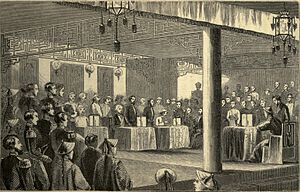Treaty of Tientsin
| Treaty of Tientsin | |||||||||||

Signing of the treaty between Britain and China
|
|||||||||||
| Traditional Chinese | 天津條約 | ||||||||||
|---|---|---|---|---|---|---|---|---|---|---|---|
| Simplified Chinese | 天津条约 | ||||||||||
|
|||||||||||
| Transcriptions | |
|---|---|
| Standard Mandarin | |
| Hanyu Pinyin | Tiānjīn Tiáoyuē |
| Hakka | |
| Romanization | Tien1 zin1 Tiau2yok5 |
The Treaty of Tientsin, now also known as the Treaty of Tianjin, is a collective name for several documents signed at Tianjin (then romanized as Tientsin) in June 1858. They ended the first phase of the Second Opium War, which had begun in 1856. The Qing, Russian, and Second French Empires, the United Kingdom, and the United States were the parties involved. These unequal treaties opened more Chinese ports to foreign trade, permitted foreign legations in the Chinese capital Beijing, allowed Christian missionary activity, and legalized the import of opium.
They were ratified by the Emperor of China in the Convention of Peking in 1860, after the end of the war.
The Xianfeng Emperor authorized negotiations for the treaty on May 29, 1858. The treaty with the British was signed less than a month later on June 25.
The Treaties of Tientsin uses several words that have somewhat ambiguous meanings. For example, the words “settlement” and “concession” can often be confused. The term “settlement” refers to a parcel of land leased to a foreign power and is composed of both foreign and national peoples; locally elected foreigners govern them. The term “concession” refers to a long-term lease of land to a foreign power where the foreign nation has complete control of the land; it is governed by consular representation.
...
Wikipedia
